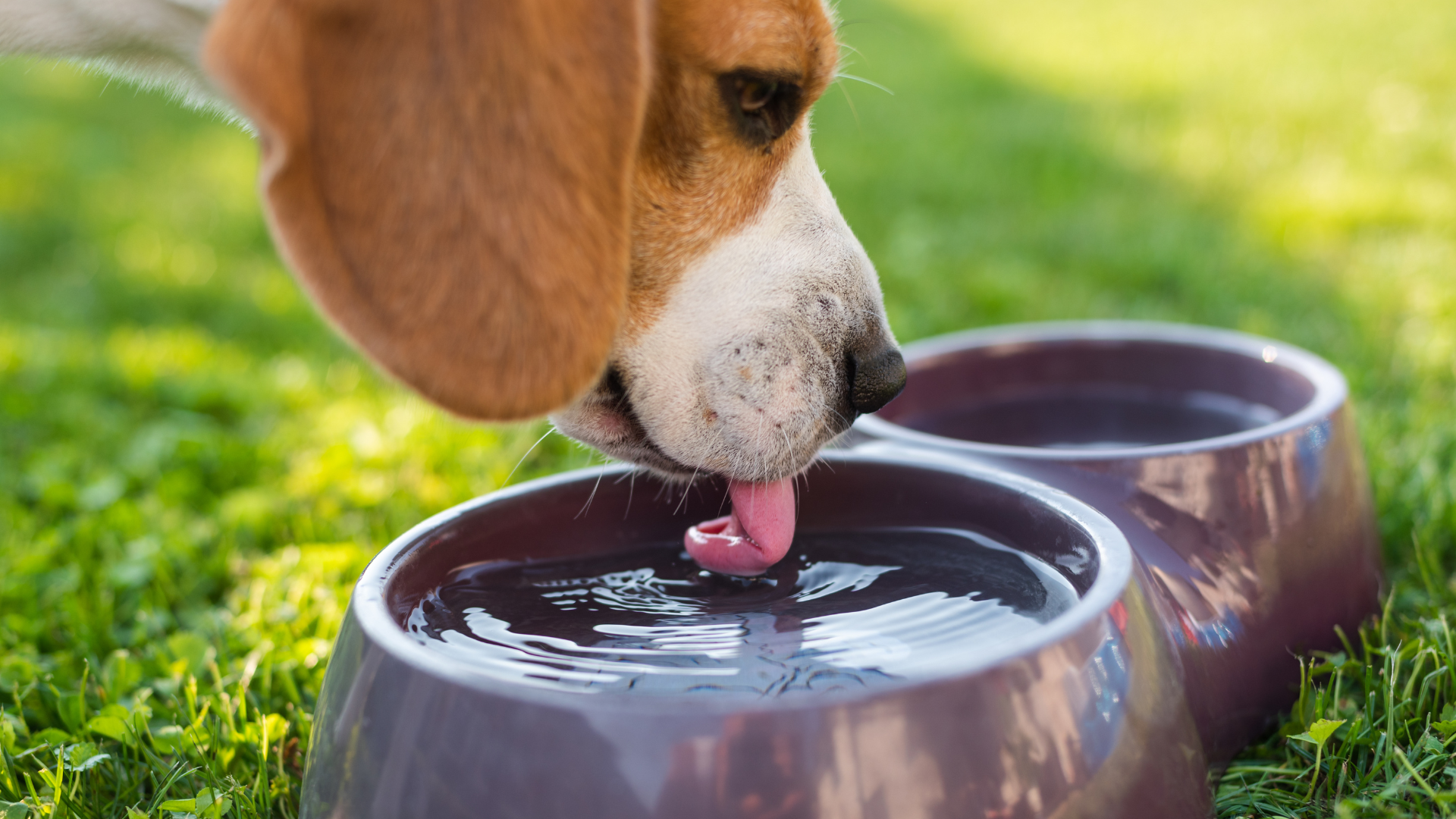Dog has blood in urine: causes, symptoms and tips
If your dog has blood in his urine, it is a worrying sign that you should not ignore. Blood in the urine, also known as hematuria, can indicate a variety of health problems. These range from more benign causes that are easily treated to serious conditions that require prompt veterinary attention.
In this article, you will learn everything you need to know about the different causes of blood in your dog's urine, how you can recognize this symptom early on, and what measures you should take to help your dog as best as possible and protect his health.
What does blood in the urine mean in dogs?
If your dog has blood in his urine, it means there are red blood cells in the urine and urinary tract. This can cause a slight pink discoloration or a distinct red color to the urine. It is important to know that blood in the urine is not a symptom in itself, but an indication of an underlying disease or injury in the urinary tract. Depending on the cause, it may be necessary to see a veterinarian immediately to prevent more serious problems in your dog's urinary tract.
How do you recognize blood in a dog's urine?
Blood in the urine can appear in different ways. It can discolor the entire urine or only appear at the end of urination. The amount of blood can also vary. Look out for these signs:
-
Reddish or brown discoloration your dog's urine
-
drops of blood at the end of the urination process
-
Difficulty or pain when urinating
Sometimes the blood is not visible to the naked eye and can only be detected through a urine test. Therefore, it is advisable to check your dog's urine regularly.
Common Causes of Blood in Urine in Dogs
Blood in the urine of dogs can have many causes. Here are the most common:
Urinary tract infections (cystitis) in dogs
One of the most common causes of blood in the urine in dogs is Urinary tract infection , especially in female dogs. Bacteria can enter the urethra and bladder and cause inflammation that can result in bloody urine.
Symptoms of a urinary tract infection:
-
Frequent urination
-
Painful urination
-
Cloudy or foul-smelling urine
A urinary tract infection can be treated with antibiotics. The vet will usually take a urine sample to determine the type of bacteria and prescribe the appropriate medication.
bladder stones or urinary stones
Bladder or urinary stones are another common cause of blood in the urine in dogs. These stones are formed due to the buildup of minerals and crystals in the dogs' urinary tract, which can cause irritation and bleeding. In severe cases, the stones can block the flow of urine, leading to life-threatening conditions in dogs.
Symptoms of bladder stones:
-
difficulty urinating
-
Frequent urge to urinate, but only small amounts of urine
-
pain in the lower abdomen
Bladder stones can be dissolved with a special diet, but in more severe cases surgery is necessary.
Injuries and Trauma in Dogs
Sometimes blood in a dog's urine can be caused by an injury to the urinary tract, bladder or kidneys. This can happen if your dog has had an accident, fallen on a blunt object or been injured by an external force.
tumors and cancer
Blood in your dog’s urine can also be an indication of bladder cancer or other tumors in the urinary tract. Tumors can damage the surrounding tissue and cause bleeding. Older dogs are at higher risk for such diseases.
Symptoms of tumors:
-
Blood in the urine that occurs repeatedly
-
weight loss
-
loss of appetite
If you suspect that a tumor is the cause, the veterinarian should perform a thorough examination to make the exact diagnosis.
kidney disease
Blood in the dog's urine can also indicate kidney disease. Kidney inflammation or infection can damage the kidney tissue, leading to bleeding and bloody urine. A quick diagnosis is important here to avoid permanent kidney damage.
Which dog breeds are particularly at risk?
Some dog breeds are at a higher risk of developing blood in the urine, especially those that are prone to bladder stones or urinary tract problems. These include:
-
Dalmatian (because of their tendency to form urinary stones)

-
Bulldogs

-
pug

-
Shih Tzu

Breed-specific tendencies to certain diseases make regular veterinary examinations all the more important.
When should you go to the vet?
Blood in your dog's urine should always be seen as a warning sign that requires veterinary examination. Even if the symptom only occurs once or with little intensity, it can indicate serious health problems that can get worse without treatment.
It is not advisable to wait and hope that the problem will resolve itself. In fact, the longer you wait, the greater the risk that the cause will worsen and become more difficult to treat.
There are certain signs that you should see a veterinarian immediately:
-
Frequent urination: If your dog suddenly needs to urinate more frequently, this could indicate a urinary tract infection or bladder problems.
-
Pain when urinating: Do you notice that your dog howls or is restless when urinating? Pain when urinating can be an indication of inflammation, stones or another disorder in the urinary tract.
-
Dark red or brownish urine: Noticeably discolored urine that appears almost black or very dark red can indicate serious illnesses such as internal bleeding or tumors.
-
Loss of appetite and lethargy: If bloody urination is combined with general fatigue, lack of appetite or even fever, this indicates an advanced disease that needs to be treated quickly.
Even if your dog is not showing any other symptoms besides hematuria, a veterinarian should be consulted. Some serious diseases, such as bladder cancer, show only very subtle signs at first. An experienced veterinarian will perform a thorough examination and, as necessary, use urine samples, blood tests, or imaging tests such as ultrasound or X-rays to determine the exact cause.
The sooner you see a vet, the sooner treatment can begin and the greater the chances that your dog will make a full recovery.
Diagnostic options at the veterinarian
The veterinarian will perform various tests to determine the cause of blood in the dog's urine:
-
Urine test: A urinalysis is the first step. This involves testing the urine for blood, bacteria, crystals and other abnormalities. Additionally, a urine culture may be performed to determine the type of bacteria.
-
Ultrasound and X-ray: Using ultrasound or X-rays, the veterinarian can look for stones, tumors or injuries in the urinary tract.
-
Blood test: A blood test can provide information about your dog's general health and provide signs of kidney disease or infection.
Treatment options for blood in the urine
Treatment for blood in the urine depends on the cause. Here are some common approaches:
-
Antibiotics for infections: If a urinary tract infection is the cause, the vet will prescribe antibiotics. These should always be given as directed to completely eliminate the infection.
-
Special diets for bladder stones: Bladder stones can often be dissolved by following a special diet. These diets are low in minerals that contribute to stone formation and help regulate the pH of the urine.
-
Surgery in severe cases: In severe cases, such as large bladder stones or tumors, surgery may be necessary to correct the cause of the bleeding.
-
Pain relief and fluid therapy: Painkillers can provide relief for your dog, especially if he is experiencing pain when urinating. In some cases, fluid therapy (eg via IV fluids) may also be necessary to flush the urinary tract and aid healing.
How can you prevent blood in your dog's urine?
There are some steps you can take to reduce your risk of urinary tract infections, bladder stones, and other problems:
-
Drink plenty of water: Make sure that your dog always has enough fresh water available. Adequate fluid intake helps dilute urine and reduce the risk of bladder stones.

-
Regular toilet visits: Avoid having your dog hold it in for too long. Regular walks and toilet breaks are important to keep the urinary tract healthy.
-
High-quality food: Feed your dog a high-quality food that is tailored to his specific needs. Some foods are designed to regulate the pH of the urine and reduce the risk of bladder stones.
-
Regular veterinary visits: Regular visits to the vet can help identify and treat problems early before they become serious. Make sure your dog's urine is tested regularly, too.
Home Remedies: What You Can Do at Home
There are some home remedies that can be used alongside veterinary treatment to support your dog's urinary tract:
-
Cranberry juice : Some dog owners swear by the effects of cranberry juice, which is said to help prevent urinary tract infections.

-
Herbal teas : Teas made from bearberry leaves or goldenrod can support kidney function.
Before using home remedies, you should always consult your veterinarian.
Conclusion: Blood in the dog’s urine is an alarm signal
Blood in the urine of dogs is not a symptom that you should take lightly. It is always an alarm signal that indicates that something is wrong in your dog's body. The possible causes range from simple, easily treated urinary tract infections, such as a bladder infection, to more serious diseases such as bladder stones, tumors or kidney damage. Bladder infections in particular are common in dogs and should be treated promptly to avoid complications. In any case, it is important to take the symptom seriously and act quickly to protect your dog's well-being.
The key to successfully treating blood in the urine in dogs is a quick and accurate diagnosis. As soon as you notice blood in your dog's urine, you should not hesitate to see a vet. A bladder infection, for example, can easily be diagnosed through a urine test and treated with antibiotics. The sooner the cause is identified, the better the chances of a full recovery.
In many cases, simple measures such as antibiotic treatment or a change in diet can restore your dog's health. In more serious cases, such as tumors or kidney damage, an early diagnosis can save your dog's life.
Also remember to take preventative measures to minimize the risk of urinary tract problems, including cystitis, in your dog. Adequate water intake plays a key role in this, as it flushes your dog's urinary tract and reduces the risk of infections and bladder stones. Regular toilet visits prevent bacteria from accumulating in the bladder and causing cystitis.
A balanced diet tailored to your dog's needs can also help reduce the risk of urinary tract problems. In addition, regular veterinary examinations are crucial to detect health problems or infections early.
Blood in the urine is always a sign that something is wrong - and it is up to you to take the necessary steps to provide your dog with the best possible care and treatment. A bladder infection, especially if detected and treated early, can save a lot of suffering. So make sure to check your dog's health regularly so that he stays happy and healthy for a long time.
